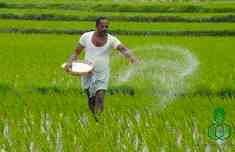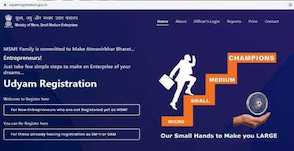National Doctors’ Day, Fertilizers for farming, Free ration scheme under PMGKAY, Digital India, Udyam Portal, ‘Accelerate Vigyan’
- Posted by Param IAS Team
- Categories Daily News, Technology/App
- Date July 1, 2020
1. India salutes our doctors on National Doctors’ Day

- National Doctors’ Day is a day celebrated to recognize the contributions of physicians to individual lives and communities.
- In India, the National Doctors’ Day is celebrated on July 1 all across India to honour the legendary physician and the second Chief Minister of West Bengal, Dr. Bidhan Chandra Roy.
- However, Dr Bidhan Chandra Roy who served as a physician, a freedom fighter, an educationist and a politician.
- Dr Bidhan Chandra Roy was born on July 1, 1882 and died on the same date in 1962, aged 80 years.
- Dr Roy passed away on his 80th birthday on July 1, 1962. He donated his home to be converted into a nursing home named after his mother Aghorkamini Devi, who was an ardent Brahmo Samaji and a dedicated social worker.
- Every year, the theme for Doctor’s day is announced by Indian Medical Association.
- The theme of National Doctor’s Day 2020 is “Lessen the mortality of COVID-19“.
- Doctor’s Day in India was established by the Government of India in 1991 in honour of Dr Roy as a great physician.
- In a tweet, the Prime Minister said, “India salutes our doctors- exceptional care givers who are at the forefront of a spirited fight against COVID-19. doctorsday 2020.”
2. Availability of Fertilizers to farming community

- Rashtriya Chemicals and Fertilizers Limited (RCF), a CPSE under the Ministry of Chemicals and Fertilizers, is committed to the well being of India’s farming sector.
- Even in the most challenging times of COVID-19, RCF has ensured the availability of its top brand Fertilizers like ‘Ujjwala’ Urea and ‘Suphala’to the farming community for Kharif sowing season.
- It is also noteworthy that RCF has improved its ranking amongst the top 500 India Fortune companies from 191 in 2018 to 155 in 2019 as per the latest published report.
- Ramagundam project along with other revival projects at Gorakhpur, Barauni, Sindri and Talcher will reduce the need for urea import by 63.5 LMT per annum.
- RFCL is upcoming gas based urea unit of 12.7 Lakh MT per annum capacity at Ramagundam, Telengana.
- It is a Joint Venture Company (JVC) promoted by National Fertilizers Limited (NFL), Engineers India Limited (EIL) and Fertilizer Corporation of India Limited (FCIL).
- The foundation stone of the project was laid by Prime Minister Narendra Modi on August 7, 2016.
- Once completed, RFCL project will reduce India’s dependency on imported urea, save foreign exchange and create jobs.
- Government of India had announced New Investment Policy (NIP), 2012 to facilitate fresh investment in urea sector and to make India self-sufficient in the urea sector.
- Under NIP, 2012, Govt of India is reviving the 5 closed fertilizer plants .
The Five Public Sector Units under revival are:-
- Ramagundam Fertilizers and Chemicals Limited (RFCL)
- Talcher Fertilizers Limited (TFL)
- Hindustan Urvarak & Rasayan Limited (Gorakhpur, Barauni and Sindri)
3. Extension of free ration scheme under PMGKAY till November 2020
- The ministry for providing additional food grains @ /month 5kg/person free of cost to all beneficiaries (AAY and PHH) covered under Targeted Public Distribution System as per provision of NFSA (including those covered under DBT).
- As Prime Minister Shri Narendra Modi for extending this scheme till November end, so that poor and needy persons will not go hungry and get free ration during the rainy and forthcoming festival seasonsat the time of current Covid-19 pandemic.
- the second phase of Pradhan Mantri Garib Kalyan Anna Yojana which is starting from today i.e. 01 July, 2020will be effective till November 2020. During this period, a total of 200 LMT grains will be distributed among 80 crore NFSA beneficiaries free of cost, as well as a total of 9.78 LMT gram will also be distributed among about 20 crore families.
- Also, the minister said, if both the schemes PMGKAY-1 and PMGKAY-2 are combined, the total expenditure will be around 1.5 lakh crore.
- Under this scheme, more than 80 crore NFSA beneficiaries of the country will continue to getadditional food grains @5kg/person/month and 1kg of gram to each family in addition to their monthly entitlement.
- In this regard, orders have been issued by the department for the State and UT governments on 30 June,2020 and all the State/UTs have been asked to start distribution of food grains with immediate effect for the next 5 months.
- Presently an additional 10% extra food grains have been allocated to States/UTs and additional allocation of food grain will be provided as and when required by the States/UTs.
- Estimated cost for distribution of foodgrains (Rice and Wheat) and pulses under Pradhan Mantri Garib Kalyan Ann Yojana during April – November 2020 is around Rs 1,48,938 crore.
4. Successful 5 years of Digital India
- The digital journey has focused on empowerment, inclusion and digital transformation and its positive impact is being felt in all aspects of the lives of Indian citizens.
- However, the Digital India journey in the past 5 years has centred around empowerment, inclusion, digital transformation.
- It has positively impacted all aspects of the lives of Indian citizens identity management through Aadhaar, Direct Benefit Transfer, Common Services Centres, DigiLocker, mobile based UMANG services, participatory governance through MyGov, Jeevan Pramaan, to UPI, Ayushman Bharat, e-Hospital, PM-Kisan, e-NAM, Soil Health Cards, SWAYAM, SWAYAM PRABHA, National Scholarship Portal, e-Pathshala, and so on.
- A ‘National AI Portal’ and ‘Responsible AI for Youth’ was launched recently to lay the foundation for an AI-powered future.
- Digital India’s initiatives have also played a pivotal role during the CoVID-19 situation, such as Aarogya Setu, E-Sanjeevani, sensitisation through MyGov and Social media platforms etc.
- The number of e-Services has increased from 2,463 in 2014 to 3,858 till May 2020.
- Daily average electronic transactions have increased from 66 lakh in 2014 to 16.3 crore in 2020.
- Aadhaar has been issued to 125.7 crore residents and 4,216 crore authentications have been facilitated.
- “Direct Benefit Transfer to the tune of Rs 11.1 lakh crore has been disbursed for 426 schemes from 56 Ministries and has led to the saving of Rs 1.7 lakh crore due.
- Jan Dhan Accounts have reached 38.73 crore beneficiaries, with a total of Rs 1.33 lakh crore in beneficiaries bank accounts.
- Mobile and internet connections are being used by 117 crore and 68.8 crore users, respectively.
- DigiLocker, launched on July 1, 2015, has 378 crore issued documents.
- Unified Mobile App for New-Age Governance (UMANG) has 860+ services operational and more than 3 Crore downloads have taken place, he further added.
- MyGov has been launched to facilitate participatory governance in the country, with a total of 1.17 Crore registered participants, while facilitating the Mann Ki Baat of the Prime Minister.
- Emphasizing the Digital India’s initiatives during the COVID-19 situation, such as Aarogya Setu for its ground-breaking development time of 3 weeks and localisation in 12 Indian languages with 13 crore downloads, with additional 3 crores for Kai OS, he informed that it has helped identify over 350 COVID-19 hotspots.
- Sensitization through MyGov and Social Media Platforms have played a crucial role in tackling the pandemic through user friendly graphics, video, quotes to citizens through the MyGov website and through all social media channels such as Facebook, Twitter, Instagram, Linkedln, Telegram, and Youtube.
- Also the other initiatives such as E-Sanjeevani, SAMHAR-COVID-19, Ayush Sanjivani Mobile app, and VC and e-Office are there under Dogotal India Programe.
- Hence, the India’s talent pool of skilled people, technology prowess and geo-political advantages are poised to make India an inspiring country in the 21st Century for the welfare of Indians and the world.
- Regarding public digital platforms “Building Digital Government Platforms for the Digital Economy of the Future” on the successful implementation of Digital India in the country.
- ‘AatmaNirbharta’ or ‘Self-Reliance’ implies development of in-house capacity and capability to drive economic and social development of the country.
5. Udyam Registration Portal For MSMEs

- Udyam Registration Portal developed by Ministry of Micro, Small and Medium Enterprises has become operational from 1st July 2020.
- The new process of classification and registration of enterprises has started.
- Alongwith launching the portal https://udyamregistration.gov.in for online registration, M/o MSME has also organized single window system at champions control rooms and DICs for facilitation.
- The new registration process will boost up ‘Ease of Doing Business’ and it will reduce transaction time and costs.
- Ministry has also clarified that except the portal no other private online or offline system, service, agency or person is authorised to do MSME registration.
6.‘Accelerate Vigyan’ the inter-ministerial scheme to strengthen scientific research mechanism
- To provide a single platform for research internships, capacity building programs, and workshops across the country, the Science and Engineering Research Board (SERB) has launched a new scheme called ‘Accelerate Vigyan’ (AV).
- The primary objective of this inter-ministerial scheme is to give more thrust on encouraging high-end scientific research and preparing scientific manpower, which can lead to research careers and knowledge-based economy.
- Recognizing that all research has its base as development of quality and well-trained researchers, AV will initiate and strengthen mechanisms of identifying research potential, mentoring, training and hands-on workshop on a national scale.
- The vision is to expand the research base, with three broad goals, namely, consolidation / aggregation of all scientific programs, initiating high-end orientation workshops, and creating opportunities for research internships for those who do not have access to such resources / facilities.
- Web portal www.acceleratevigyan.gov.in.
- Straight off the block, AV has already called for applications under its ‘ABHYAAS’ component for the Winter Season.
- The institution is also planning to launch an app for this in the coming two months.
- ‘ABHYAAS’ programme has two components: High-End Workshops (‘KARYASHALA’) and Research Internships (‘VRITIKA’).
- Another new component under AV is ‘SAMMOHAN’ that has been sub-divided into ‘SAYONJIKA’ and ‘SANGOSHTI’. SAYONJIKA is an open-ended program to catalogue the capacity building activities in science and technology supported by all government funding agencies in the country. SANGOSHTI is a pre-existing program of SERB.
"Start where you are. Use what you have. Do what you can."
"The secret of success is to do the common things uncommonly well."
"Good things come to people who wait, but better things come to those who go out and get them."
"Success is the sum of small efforts, repeated day in and day out."
Read, Read, and .....Read..
You may also like
Information Technology (IntermediaryGuidelines and Digital Media Ethics Code) Rules 2021
With the growing concerns around lack of transparency, accountability and rights of users related to digital media and after elaborate consultation with the public and stakeholders, the Information Technology (Intermediary Guidelines and Digital Media Ethics Code) Rules 2021 has been …
Union Budget 2021-22
Union Budget 2021-22 The budget for the year 2021 has been presented amidst exceptional circumstances. Today’s Budget contains a vision of self-reliance as well as inclusiveness for every individual and class. The budget has principles of new opportunities for growth, …
Foster digital literacy and accelerate the India startup ecosystem with Atal Incubation Centers Atal Innovation Mission (AIM), NITI Aayog and SAP Labs India have strengthened their partnership to promote digital literacy, innovation and entrepreneurship in India. As part of the …
